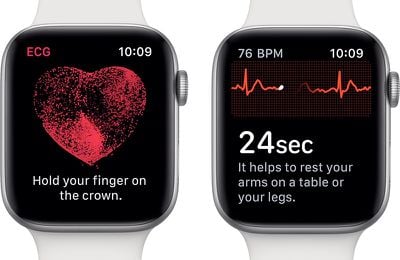The single-lead ECG function on Apple Watch isn't meant to be as informative or as sensitive as the multi-lead ECGs you might get in a doctor's office or hospital, which use several points of contact. However, a new article in The European Heart Journal tells the story of an 80-year-old woman whose Apple Watch detected evidence of a heart condition that was missed by a hospital ECG (via 9to5Mac).

According to the article, the woman presented at University Medical Center Mainz, Germany, complaining of chest pain, irregular heart rhythm, and lightheadedness. When doctors at the hospital performed a 12-channel ECG, it revealed "no evidence for ischemia," which occurs when blood flow to the heart is reduced, preventing the heart muscle from receiving enough oxygen.
However the woman then showed doctors her Apple Watch ECG results, which included "tracings with marked ST-segment depression." After studying the Apple Watch results, doctors did indeed see evidence of myocardial ischemia, and the woman was transferred to the catheterization lab for a "left main stem stenosis and a left anterior descending/diagonal bifurcation lesion," and treatment with coronary artery stenting.
Essentially, the Apple Watch ECG recordings showed evidence of a heart condition that the hospital's specialized equipment failed to pick up, and that convinced the doctors to treat the patient, who left the hospital the next day.
The report concludes that the Apple watch may be used to reliably detect myocardial ischaemia.
The development of smart technologies paves the way for new diagnostic possibilities. In the case of the Apple Watch, after the mobile application is installed, the records an ECG when a finger is placed on the watch’s digital crown. A 30-s tracing is stored in a PDF file that can be retrieved from the application.
Thus, the Apple Watch may be used not only to detect atrial fibrillation or atrioventricular-conduction disturbances but also to detect myocardial ischemia. An apple a day may keep myocardial infarction away.
You can read the full report here. Rumors regarding the Apple Watch Series 6, expected to launch later this year, suggest additional health-related features mental, including blood oxygen detection, sleep tracking, and stress detection.





















